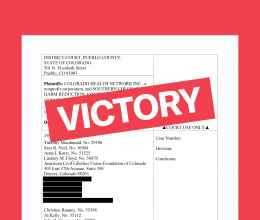Imagine an airline requiring Jews to provide written documentation of their faith in order to receive a kosher meal. Preposterous, right? It's called faith for a reason. At its core, religion is a personal choice. Yet for prisoners in an El Paso County Jail, until recent intervention by the ACLU of Colorado, faith wasn't enough.
For inmates whose religious beliefs extended to their meals, i.e. keeping kosher, halal, or vegetarian, simply stating a need for a particular diet was insufficient. They had to provide a letter from a “licensed/ordained clergy person” confirming their status as a practicing member of the faith before the jail would serve them religious meals.
This policy created a clear barrier to prisoners’ ability to practice their religion. Such an obstacle is in clear violation of both the First Amendment and federal statute, which holds that no prison shall impose a substantial burden on the religious exercise of a prisoner, unless jail authorities can demonstrate that the imposition of that burden 1) is in the furtherance of a compelling governmental interest; and the burden 2) is the least restrictive means of furthering that compelling governmental interest.
Demanding written verification by a third party presents considerable problems for incarcerated believers. Even for those prisoners who belong to a mainstream denomination, limited access to telephone, email and postal communication could delay or prevent their free exercise of religion.
Problems could also arise from a variety of other situations. Prisoners may convert during their time in jail and not have access to a “licensed/ordained clergy person”. They may not be able to find contact information for their clergy person or that person might not respond to prisoners’ letters. They might adhere to a religion that does not license its clergy in a manner suitable to El Paso County, or may not license or ordain clergy at all. Any of these scenarios would prevent a sincere believer from adhering to his or her religious principles.
Legal precedent requires only that an inmate’s beliefs be sincerely held, not confirmed in writing by a priest, rabbi, cleric or minister. In a letter to the jail, ACLU of Colorado Staff Attorney Taylor Pendergrass explained the unconstitutional nature of the policy, noting the relevant statutes and cases. Upon receipt of the letter, the Sheriff’s Office ended the practice.
Colorado Gives Day
Donations are now open for 2024!

